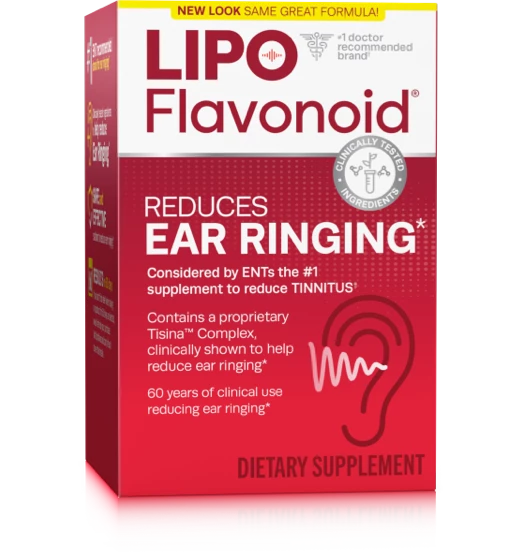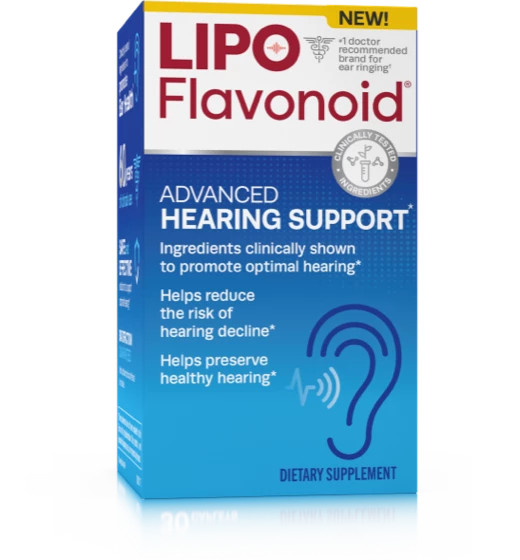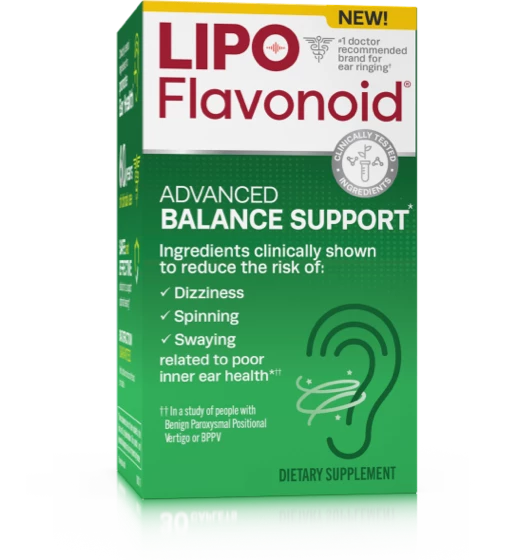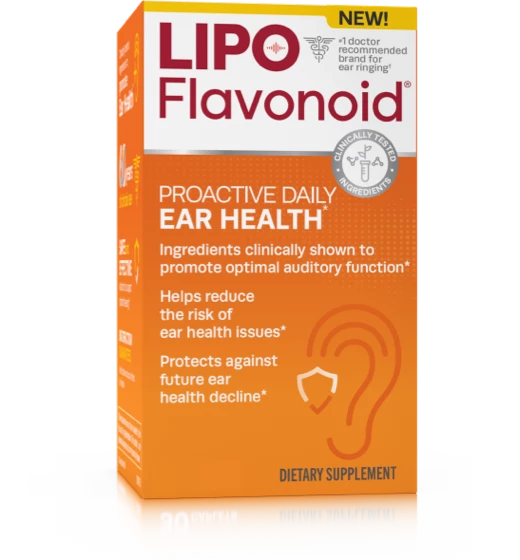- Products
- Science
-
Resources
- Tinnitus Resources
- What is tinnitus?
- Causes of tinnitus
- Tips for managing tinnitus
- Prepare for your doctor's visit
- PTSD and tinnitus
- Tinnitus FAQs
- Hearing Loss Resources
- What is hearing loss?
- Degrees of hearing Impairment
- Types of hearing loss
- Causes of hearing loss
- Treatment options for hearing loss
- Buy Now
- Coupons
- Test Your Hearing
- Test Your Hearing
- Healthcare Professionals
Living with Tinnitus? Here are 7 Tips for Holiday Sur-Thrival
According to a Consumer Reports holiday poll 1a, 64% of adults in America dread holiday crowds and long lines and 19% dread attending holiday parties or events.
But if you’re one of the nearly 1 in 5 people who suffers with tinnitus, or ringing in the ears, you may experience holiday dread for a number of additional reasons. But don’t worry, you’re not alone in this. To help you make the most of the season and feel your best throughout, we’ve compiled some helpful holiday hints.
- At noisy holiday parties and events, position yourself far away from sound sources. Every 15 to 20 minutes give your ears a break by finding a quiet spot to “escape.”1 Maybe by the fire? Or take a breather in the fresh, crisp outdoors? If you’re lucky they’ll be snowflakes to add the mood.
- Love the festive music? Listen up and enjoy – just don’t use earbuds too loud or for too long. The American Tinnitus Association recommends reducing the volume and taking frequent silence breaks.1 Similarly, the Campaign for Better Hearing2 reminds us to listen with earbuds at just 60% of maximum volume for no more than 60 minutes per day. After that, share your music with family and friends by playing it with a speaker so all can hear. Again, not too loud and keeping in mind that nearly everyone can benefit from music. In fact, according to American Society of Hypertension, listening to soothing music (like classical, Celtic or Indian raga) for just 30 minutes a day for one month can significantly reduce blood pressure?3 Sorry, Grandma Got Run Over By a Reindeer does not count.
- When you get home from that office party or shopping, give your ears a break with white noise. A fan or other background noise can help disguise the sounds of tinnitus. Turn up the white noise so that it partially or completely covers the sound of your tinnitus or at least helps distract you from it. Ideally the white noise should be relaxing and provide you with a temporary respite. Try nature sounds, a fountain, or soothing music.4 For improved sleep, even over the holidays, you can also use Sonorest Sleep Tones. [/home/20-sonorest-sleep-tones-machine] Sonorest helps to create a tranquil, soothing environment to help tinnitus sufferers relax and fall asleep plus it makes a great gift!
- The holidays are so busy and, to make matters worse, the end of the year is often crunch-time for many workers. This makes our next tip probably the toughest to stick to, but it could also be the most worthwhile. Look after yourself! Regular exercise, a balanced and nutritious diet, good sleep [/ringing-true/sleep-tips/tinnitus-rest-easier-with-practical-sleep-solutions] habits, and stress reduction strategies can help to keep your blood vessels healthy and improve your general well-being, which, in turn, can help to improve your tinnitus symptoms and your ability to deal with them. According the to the American Tinnitus Association, “A health-conscious diet [/ringing-true/tinnitus-relief-tips/eating-for-your-ears] can reduce hypertension and weight, increase blood flow, heighten energy levels and improve emotional well-being — all of which can benefit your tinnitus.” 5, 6
- It’s not peppermint-flavored or eggnog-flavored but you should still try a nutritional supplement that can support ear health. With consistent use as directed, the nutrients in Lipo-Flavonoid® Plus have been shown to improve the symptoms of tinnitus in some people.7-13 Lemon bio-flavonoids, like those in Lipo-Flavonoid® Plus, are thought to help relieve tinnitus symptoms by: improving microcirculation in the inner ear 7,14 preventing abnormal accumulation of fatty deposits,14,15 and blocking histamine production in the inner ear, a likely cause of inner ear disturbances.9 According to a survey of 250 ear, nose and throat specialists (otolaryngologists), 100% recommend nutritional supplements to their tinnitus patients and 85% recommend the brand Lipo-Flavonoid® specifically.16
- Since we mentioned eggnog… You may actually want to avoid it if you suffer from tinnitus. There has been some association between avoidance of eggs and reductions in persistent tinnitus. This association could, hypothetically, be linked to eggs as a source of dietary cholesterol. 17
- What about those other festive libations? Again, if you’re trying to control your tinnitus, you might want to avoid them. In one small study, 84% of patients reported that their tinnitus was aggravated by alcohol and 73% said that alcohol made them more aware of their tinnitus.18 Tis the season to be jolly and you can be jolly without alcohol. Just ask Santa.
- Wishing you and yours wonderful weeks to come!
- REFERENCES:
- What Americans Dread Most About the Holidays. Consumer Reports website. https://www.consumerreports.org/money/what-americans-dread-most-about-the-holidays/. Accessed Nov. 17, 2017.
- Understanding the Facts. American Tinnitus Association website http://www.ata.org/understanding-facts/causes. Accessed Sept. 9, 2016.
- 5 Ways to Listen to Music Without Damaging Your Ears. Campaign for Better Hearing website. http://campaignforbetterhearing.org/2016/06/5-ways-to-listen-to-music-without-damaging-your-ears/. Accessed Nov. 17, 2017.
- ASH: Daily Doses of Bach and Breathing Lower Blood Pressure. MedPage Today website. https://www.medpagetoday.com/meetingcoverage/ash/9597. Accessed Nov. 17, 2017.
- Sound Therapies. American Tinnitus Association website https://www.ata.org/managing-your-tinnitus/treatment-options/sound-therapies. Accessed Nov. 17, 2017.
- Thoughts on Diet and Hearing Loss. American Academy of Audiology website http://www.audiology.org/news/thoughts-diet-and-hearing-loss. Accessed Nov. 17, 2017.
- General Wellness. American Tinnitus Association website https://www.ata.org/managing-your-tinnitus/treatment-options/general-wellness. Accessed Sept. 12, 2016.
- Slattery W, Fayad J. Medical treatment of Meniere’s disease. Otolaryngologic Clinics of North America 1997; 30:1027-37.
- Fetterman B, Saunders J, Luxford W. Prognosis and treatment of sudden sensorineural hearing loss. Am J Otol 1996; 17:529-36.
- Arenberg I, Bayer R. Therapeutic Options in Meniere’s Disease. Arch Otolaryngol 1977;103: 589-93.
- haia F, Sheehy J. Sudden sensori-neural hearing impairment: a report of 1,220 cases. Laryngoscope 1976; 86:389-98.
- Herschberg S. Meniere’s disease. J Am Osteopathic Association 1974; 73:540-6.
- Wolfson R. Treatment of Meniere’s disease. Modern Treatment (1969) 6,3, 553-567.
- Williams, H.L. & Hedgecock, L.D. Citrus Bioflavonoids, Ascorbic Acid and Other B-vitamins in the Treatment of certain types of neurosensory deafness a preliminary report”. Staff meeting of the Mayo Clinic (1962)
- Rubin W. Vestibular suppressant drugs. Arch Otolaryngol 1973; 97:135-8
- Kumar S, Pandey AK. Chemistry and Biological Activities of Flavonoids: An Overview. The Scientific World Journal. 2013;2013:162750. doi:10.1155/2013/162750.
- April 2016 Survey. Clarion Brands Inc. Data on file.
- McCormack A, Edmondson-Jones M, Mellor D, et al. Association of Dietary Factors with Presence and Severity of Tinnitus in a Middle-Aged UK Population. Zheng Y, ed. PLoS ONE. 2014;9(12):e114711. doi:10.1371/journal.pone.0114711.
- Detrimental effects of alcohol on tinnitus. Stephens D Clin Otolaryngol Allied Sci. 1999 Apr; 24(2):114-6.
*These statements have not been evaluated by the Food and Drug Administration. These products are not intended to diagnose, treat, cure or prevent any disease.
*Survey data on file
REFERENCES:
- April 2018 Survey. Clarion Brands Inc. data on file.
- Williams H, Hedgecock L. Citrus Bioflavonoids, Ascorbic Acid and Other B-vitamins in the Treatment of certain types of neurosensory deafness a preliminary report. Staff meeting of the Mayo Clinic (1962).
- Tinnitus Overview. Mayo Clinic website http://www.mayoclinic.org/diseases-conditions/tinnitus/basics/definition/con-20021487. Accessed Sept. 7, 2016.
- Understanding the Facts. American Tinnitus Associations website https://www.ata.org/understanding-facts. Accessed Sept. 7, 2016.
- Slattery WH, Fayad JN. Medical treatment of Meniere's disease. Otolaryngologic Clinics of North America 1997; 30:1027-37.
- Kumar S, Pandey AK. Chemistry and Biological Activities of Flavonoids: An Overview. The Scientific World Journal. 2013;2013:162750. doi:10.1155/2013/162750.
- Fetterman BL, Saunders JE, Luxford WM. Prognosis and treatment of sudden sensorineural hearing loss. Am J Otol 1996; 17:529-36.
- Arenberg I, Bayer R. Therapeutic Options in Meniere’s Disease. Arch Otolaryngol 1977;103: 589-93.
- Shaia F, Sheehy J. Sudden sensori-neural hearing impairment: a report of 1,220 cases. Laryngoscope 1976; 86:389-98.
- Herschberg S. Meniere’s disease. J Am Osteopathic Association 1974; 73:540-6.
- Wolfson R. Treatment of Meniere’s disease. Modern Treatment (1969) 6,3, 553-567.
- Rubin W. Vestibular suppressant drugs. Arch Otolaryngol 1973; 97:135-8




